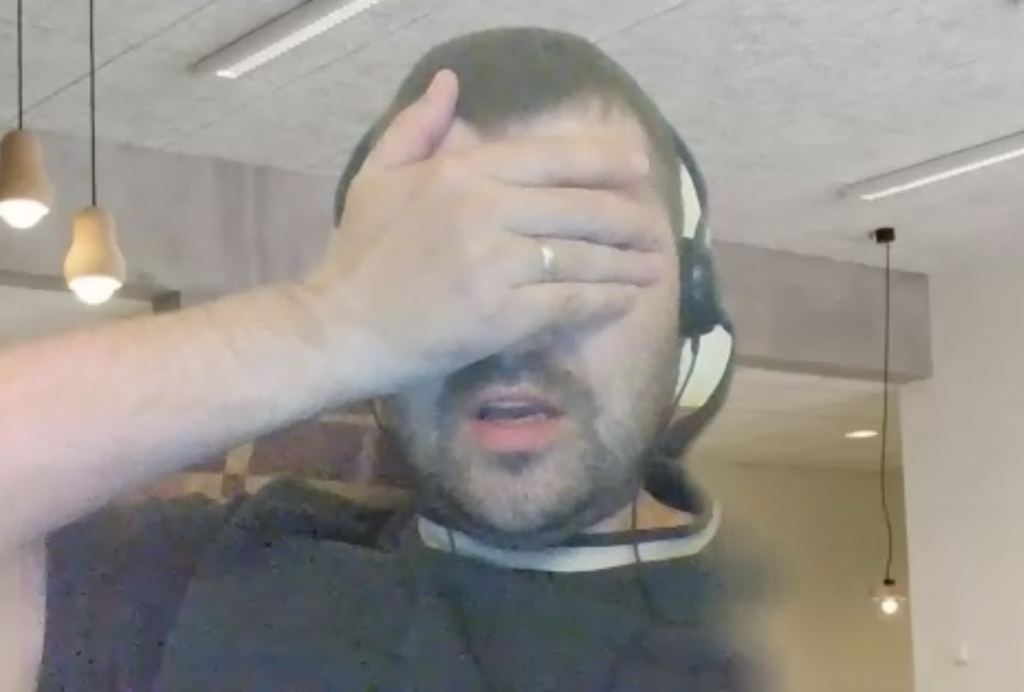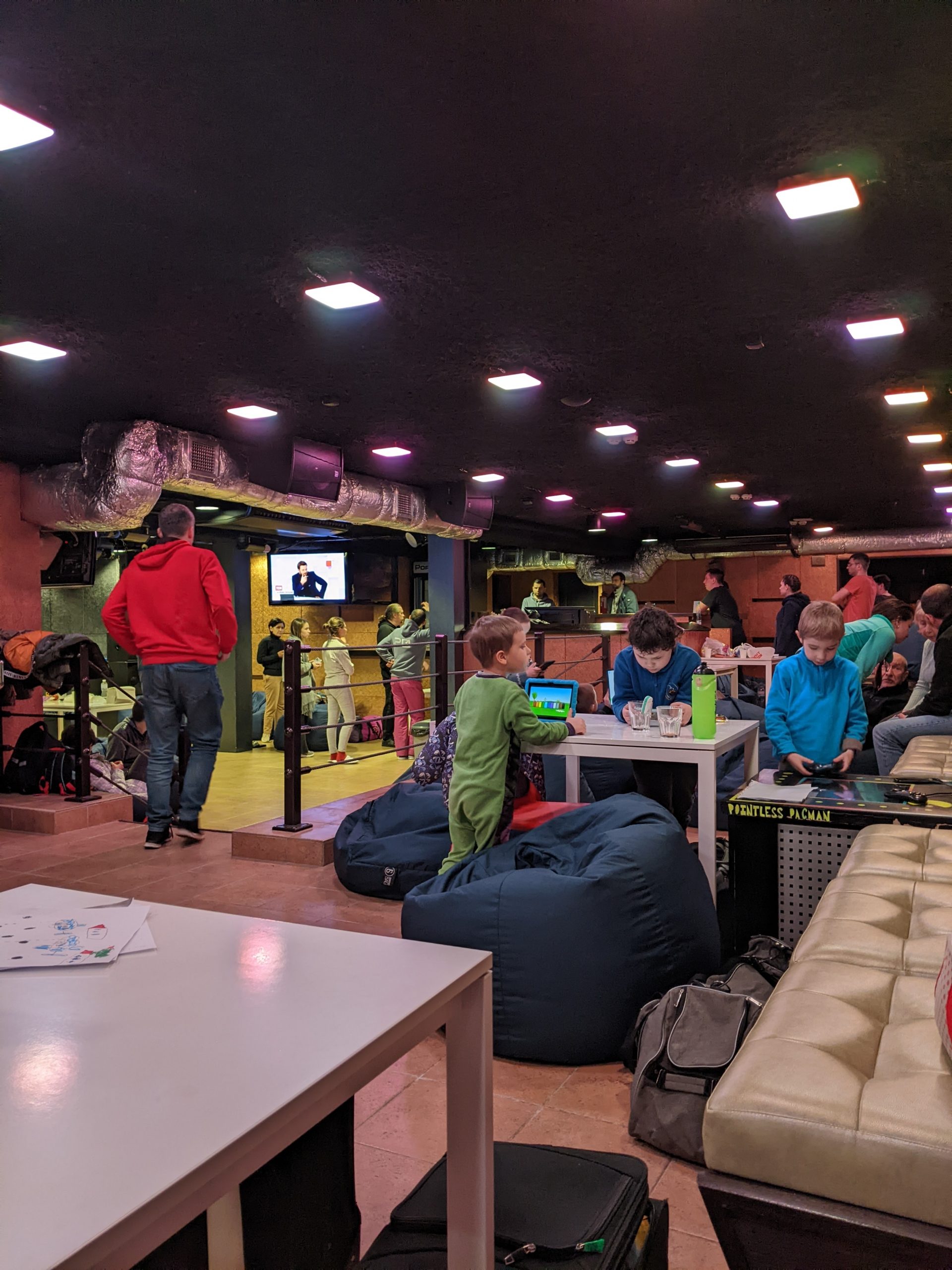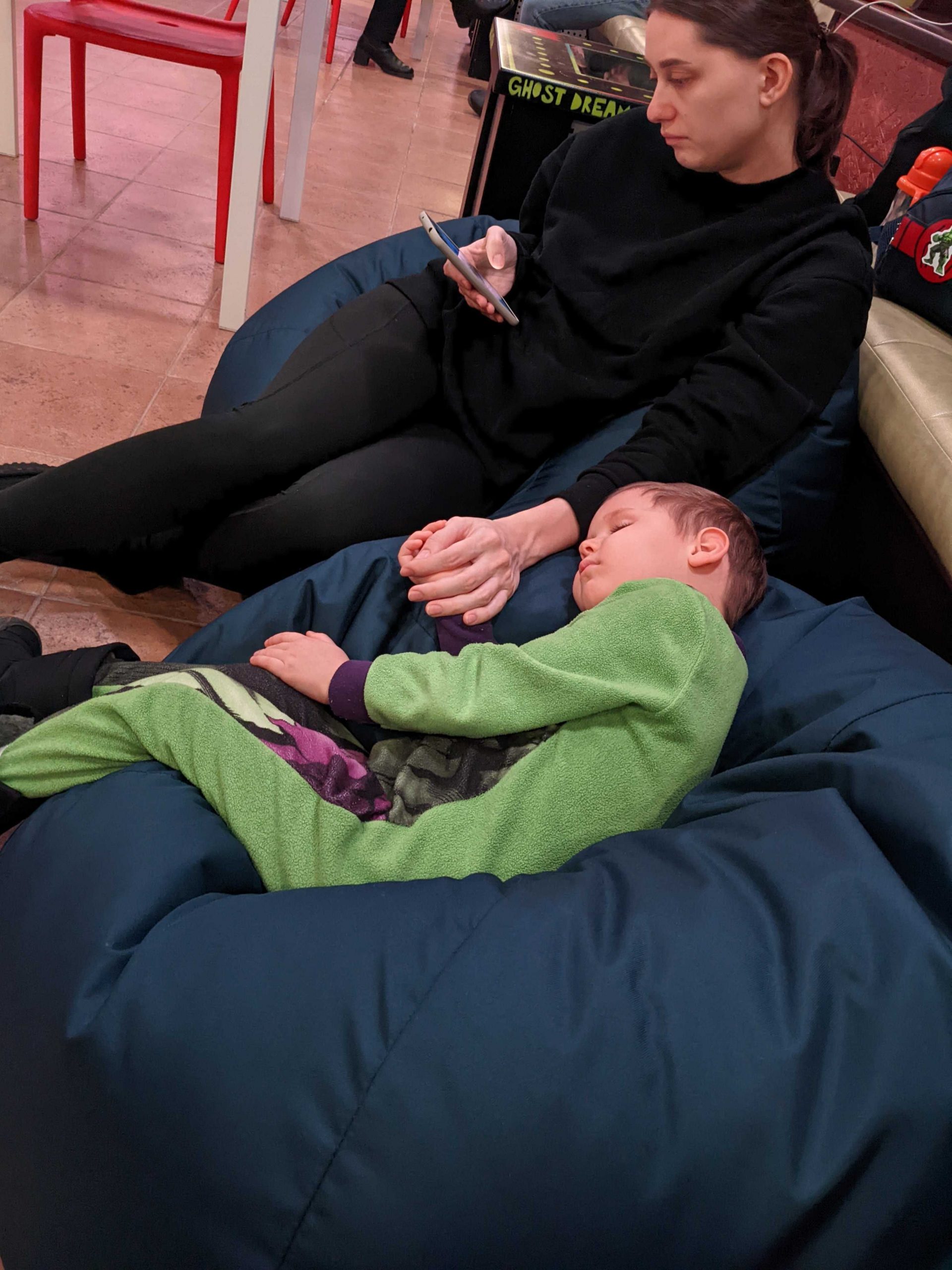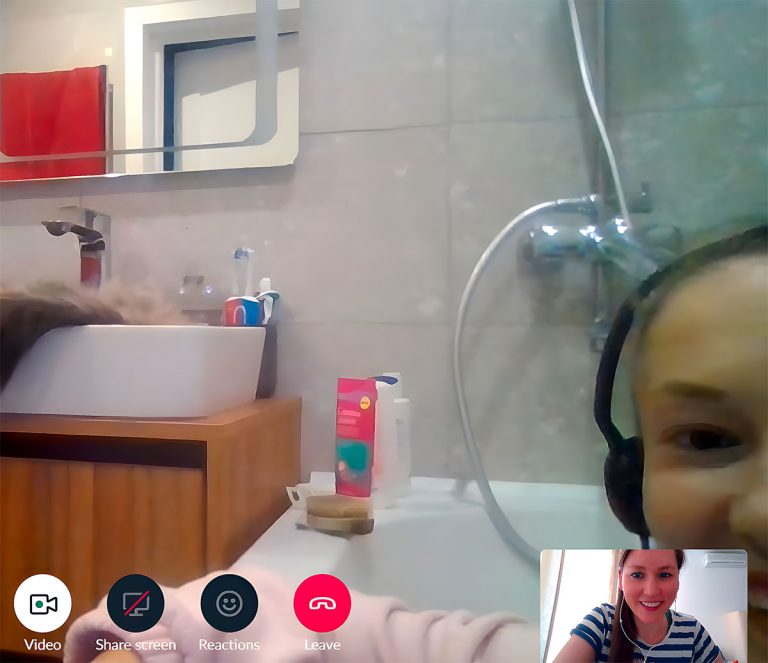A question recently arose when we were discussing the stories PortaOne needs to tell. We asked ourselves: Should we show the stories of our company and the entire Ukrainian tech business during this war, while the conflict is ongoing and Russian rockets are pouring over our heads? Yes, we decided. We should. There is an internal joke we tell ourselves, a black-humored one, in which we say that PortaOne hit the trifecta “jackpot.” Before the war, we had technology centers in Kyiv, Chernihiv, and Sumy — three cities that had been under severe and brutal attacks and air raids since the first days of the war. “We should open additional locations in Kharkiv, Mykolaiv, and Slovyansk,” a team member joked.
Humor helps you stay sane when the guns are firing. We collected first-person accounts from our teammates in all three locations. In addition, we added one story from a person on our team who prefers to work from home (or, more specifically, from the trench).
Filtering Out the Filtration Camps
For the sake of privacy and the safety, we are using Slack handles instead of real names in these stories. Unfortunately, Gestapo-like interrogations are happening now at the filtration camps for Ukrainians seeking to escape from the “Russian liberation.” So far, all our friends and colleagues have managed to get to safety through the territory controlled by the Ukrainian Army without having to experience this “filtration” procedure. Still, the war is going on. And while we all hope for better, we don’t know where destiny will bring the heroes of these stories.
The Tech Crowd Heroes Come to the Rescue
Let’s start with a silver lining: Ukraine fights back with powerful and efficient blows. Our blossoming tech industry leads this fight. From the frontlines to volunteer drone factories and soup kitchens, Ukrainian IT entrepreneurs are helping their country.
Our conventional “leading industries” (metallurgy, agriculture, and chemicals) are now gravely affected by logistics and raw materials disruptions, destroyed factories, galloping inflation, and a scared local labor force. In stark contrast, Ukraine’s tech crowd can literally work (and pay taxes) from anywhere. Plus, you don’t need a factory or a warehouse to write code, documentation, or blog posts. Instead, you need motivation, a git repository, communication tools (hello, CPaaS), and knowing that your family is safe.
The Painful Beauty
Companies like PortaOne bring your much-needed dollars and euros to the Ukrainian economy, while working from the global cloud. We could have quickly “moved on” and emigrated. However, there is some painful – yet “our own” – beauty back home. It gives us adrenaline and a feeling of completeness to be with our people during difficult times.
Someday, we hope, these efforts will earn their reward. We hope to win this war, get over our Soviet past, and become a welcomed member of the European family of nations and the European tech cluster.
@Mitchell
@Mitchell is our business analyst. His primary area of expertise is data migration. “We live in Sumy with my family. The HQ of the local territorial defense unit is located in my backyard. During the first weeks of the war, our local territorial defense unit was the major defender of the city. So most of the bombs and rockets they aimed at our defenders were falling around my backyard.” Territorial defense consists of ordinary civilians who have prior military experience. In many Ukrainian cities under siege, the local population assisted the territorial defense units – usually armed only with hunting rifles, or with no guns at all.
“What the Hell Happened to My Internet Connection?”
“I had an onboarding webinar planned in the early morning of February 24 with a client from Australia. So I went to sleep early on February 23 and scheduled an alarm for the early morning. I woke up and checked the news. Everything looked okay. Then I realized that my newsfeed was not updating.
The WiFi router had no Internet connection. I returned to our bedroom to tell the wife I would drive to the office because something had happened to our home Internet. She was already in tears because a teacher at the kindergarten had alerted all the parents via a Viber group. We still had LTE working at that moment.
It took some time for the news to sink in. Then I stormed out to the ATM, grocery store, and gas station. It was Thursday, and I usually refueled my car during the weekend. However, the sirens were already yelling. Then the bombs started falling. I called my regional manager (@bartholomew). He told me he was driving his family to friends in Western Ukraine. He asked me to stay in a shelter and offered to manage all the event cancellations for the day.”
Three Weeks in the Basement
“We created a makeshift neighborhood watch at the entrance to our apartment building and the backdoor alley. We had no guns. If we discovered something suspicious, one of us would walk to the territorial defense HQ and tell them they should see it. We blocked the doors with iron bolts so that no strangers could enter at night.
There’s an artillery school in Sumy. It’s home to the famous 27th Rocket Artillery Brigade. The brigade itself wasn’t there when the war came to Sumy. They were fighting in Donbas. Russians tried to capture the artillery school but failed. Then they shelled it with artillery, razing the building to ground zero.
The basement our families were hiding in is just an ordinary basement, not a bomb shelter. It had been abandoned and dirty for decades. So we cleaned it and equipped it with improvised beds. This way, our wives and kids had a place to stay during the shelling. One of the neighbors would walk to the city when it was safe, looking for drinkable water, food, and medicines.”
The Powerbank to Work at Night
“So I wouldn’t go crazy, I started working at night when it wasn’t my watch. During the day, I charged my power bank with the help of the military. That enabled several hours of work at night. I had to plan my work thoroughly to get maximum things done before the battery ran out. The LTE modem miraculously continued to work. It allowed me to stay in touch with clients and colleagues.
Work gave me a refuge from the war. But I realized that I was the only one who knew how to migrate this one Australian client. If something happens to me, Australians will lose several months of joint work. Unfortunately, with customer migrations, certain things still have to be done manually, even in the age of Kubernetes, public and private clouds, and so on.
We had a backup server. So I spent evenings writing detailed instructions for my Australian colleagues and our technology team in Barcelona on how to set up the entire migration framework for this customer, should something happen to me.”
The Flat tire, the Shelling, and the 80-Kilometer Convoy

“The situation was getting worse. More and more bombs were falling on the city. We decided it was time to leave. We arranged for a day and a starting place and formed a column. There was a rumor that Russians wouldn’t touch this particular guy in this specific car. So we arranged to follow him. When we were leaving Sumy, I punctured both right tires. Thank God I have ’run-flat’ tires you can still drive on (a little bit) even if they are punctured. So I drove 80 kilometers on those tires. Then, all of a sudden — a miracle. We saw a tire repair shop on a deserted highway in the middle of nowhere. The shop was closed. I had never banged on a door so hard in my entire life. My friend’s family was also traveling with us. So we all continued banging together.“
“You Can Pay Us After the Victory”
“A dude arrived from the shop. After fixing my tires and discs, he said, ’You can pay us after the victory.’ We found a hotel near Poltava and slept there. The following day my car broke down near Kremenchuk. We got it going somehow and got to Cherkasy. My friend has a family there, though they are now in Poland. They welcomed us to their place.
That’s where I’ve spent the past two months, and that’s from where I’m on a call with you right now. I never thought the people I never saw before would become almost like a family to us. We call each other daily. We watch after their garden. But, unfortunately, they don’t want to accept any rent from us.
I’m so sorry I can’t give you any photos and videos. We all had to cleanse our smartphones and laptops to be safe if captured by Russians.”
@Madball
“We were woken up at 5 AM on February 24 by the sound of rockets shelling the city. A family friend called and told us they were leaving for Western Ukraine. My wife is now pregnant with our second child, and we decided it would be safer to stay. Then, a message appeared in our corporate Slack. It invited the entire Chernihiv team to bring their families and stay in the basement at the office. After hearing explosions, I packed my family and drove to the office.


The kids of PortaOne team members playing in the Chernihiv office basement while their parents watch the worrying news on the TV and on their smartphones. The “PortaOne cellar” (a reimagined loft at an abandoned Soviet factory) is a popular place for Ukrainian rock bands to play when performing in Chernihiv. Unfortunately, during the 2022 escalation phase of the war, it became a bomb shelter for our team and their families.
Staying Together in the Office
“It was way easier to cope with this nightmare together. We supported each other. Some people cried. This is the way we spent the first several days. Then it became clear that Chernihiv was under siege and that Russians were trying to encircle the city and block any ongoing or outgoing traffic. On top of the pregnancy, my wife has a medical condition that requires certain medicines. It has never been easy to get those medicines, even in times of peace. Now, it had become almost impossible. I realized we had to leave. It was dangerous, but it would have been even more dangerous for my lady without this medicine.”
The Route to Chernivtsi
“The bridge across Desna River was still intact at that time. We monitored the news, waiting for the best time to cross. Russians shelled the bridge regularly. Then, one day, a friend called, telling me, ’It’s now or never.’ We arranged a small column of five cars and drove. On my way toward Kyiv, I picked up a colleague at a village alongside the highway. She was visiting her parents when the war started. Initially, she decided it would be safer to stay there, and then got stuck when the fighting came closer.
There was heavy fighting around Kyiv at that time. So we drove eastward at Brovary belt road to avoid Kyiv and crossed Dnipro near the Kaniv reservoir. We spent our first night in a Soviet-like hotel in Korsun-Shevchenkivskyi, right in the middle of the town market. Four people and a boy were in a small room with two beds.
After that, we went to Chernivtsi in Western Ukraine. It was some old Soviet sanatorium in the suburbs. So we spend a night there. It was our second night on the road. Then @Sat (my boss) found an apartment in Lviv for us via his friends. We are still there as of now. The people and the city are very hospitable. People won’t accept any money from us.
Lviv, Coffee… Sirens and Missiles
“It’s interesting how you survive the ordeal of a besieged city. During the first days in Chernihiv, the sirens were a total mess for us. There was almost no training for the people before the war started. Only in Lviv did I realize that the first siren is a notification to ’go to the shelter’ and the second is saying ’shelter time is over, go back to normal life.’
Of course, after some time, we started ignoring the sirens. It’s a similar story to COVID masks in public transport. When the first stupid person removes the mask, everybody is shocked. Then the second, the fifth… And then you start regarding people still wearing masks in the subway as ’paranoiacs.’”
A Coffee That Is Hot as a Missile
“My carelessness quickly passed when we were drinking coffee in the park on a bench next to our house, and the next moment, I saw a Russian ’Kalibr’ missile flying only meters above the treetops. It was so close I could read the instructions, make, and model on the iron plate attached to the rocket. Then came a loud bang. The missile landed somewhere within the city. Had we been closer — we might have become its casualty. Even after miraculously escaping from the war in Chernihiv.
We are still in Lviv as of now. Frankly, I’m puzzled about where we should go next. Before the invasion, I got detailed drawings of our future family house near Chernihiv. That was our dream for so many years. The construction was due to start this spring.”
@Suzy
@Suzy runs operations for PortaPhone — our webRTC-based dialer app for smartphones. She is the PortaOne liaison to WebTrit, a startup that emerged out of the PortaOne Startup Accelerator Program with the mentorship assistance of Andriy Zhylenko, PortaOne CEO. WebTrit supplies the technology powering PortaPhone, a product highly sought by telcos worldwide. “We knew the war was coming (after all, it was in the news for almost four months), and we had everything arranged with my boyfriend. He would go to the army. I would grab my mom and my cat, Phoenix, then drive them to safety and pray for my dude.
So with the first sounds of missiles and blasts, around 5 AM on February 24, I hit the road. I had a gut feeling the day before, so most of our bags and the food for Phoenix were already in the car by the evening. The road was relatively safe and empty. It took me 28 hours to get to Kremenets, in Ternopil Oblast. We spent the first month of the war there while there was heavy fighting in Chernihiv.”
Returning (and Working) Back in Chernihiv
“After the Russians lost the battle of Chernihiv and retreated, we returned so I could be closer to Ihor. He was on the frontline during the siege of Chernihiv. Now, he is near the border to the north of our oblast. There’s still shelling and air raids. However, life is slowly getting back to normal. We finally held that PortaOne webinar. It had the most people registered among any PortaOne webinar ever. Just before the webinar, as I as ready to launch Zoom, I thought, ’Okay, air raid siren, where are you?’ And, of course, the little bitch sounded right when it was my time to present. I considered the odds and decided I would still be present from the bathroom.“
The “Siren Cat” Picture
“Thank God (and Zoom and our chief designer, Saša) that PortaOne has virtual backgrounds. I only had to mute my mic when I wasn’t speaking — to avoid letting the sirens scare everyone on the call. When the presentation was over and everyone had left, we switched to a Slack call with Tanya, my friend from Barcelona. To add more drama: Tanya is originally from Murmansk, Russia. Now, though, she is doing her best to help Ukraine.“ [Editor’s note: there’s a separate blog story coming on this soon.]
“Like me, Tanya is a big fan of cats, particularly my Phoenix. ’Wanna see what Phoenix looks like now?’ I asked her. We laughed. Then we cried. Then she asked if she could take a screenshot.”
The Lucky Bastard
It’s always difficult for content producers to write about themselves. 😳 But this is me, Hennadiy, the dude who wrote this post, and many others in this blog. My cooperation with PortaOne started in 2019, when a friend introduced me to to his old university pal, Andriy Zhylenko, saying, “You two should get together.” Since then, I have written several white papers for Andriy, and onboarded the PortaOne product management team into the design sprints process.
Before the war started in 2014, I worked in the new products department at Kyivstar, Ukraine’s largest telco. Returning to ”normal life” was challenging after having spent most of 2014 and 2015 with the army (I was stupid enough to volunteer). So I left Kyivstar and settled in Obyrok art village, in Chernihivska Oblast. From there, I started working online. It was years before COVID, “the new now” of WFH, or the Russian escalation of the war.
In a remote place in the middle of nowhere, you can quietly experience your post-war trauma and drama without creating too much trouble for other people. There, I grow my garden and raise my three kids. My wife is still a “city girl,” so usually, I spend half of the week in “internal immigration” to the art village and the other half of the week (or, more often, the weekend) with the family in Kyiv.
The Warning Signs and Moving the Family to My Home City
“I am not going anywhere. I have my medical students, after all. There are midterms now! We have a dacha near Bucha — it’s heavy woods and to the West of Kyiv. I will stay there. I don’t believe the Russians will attack. Putin is bad, yes, but he is not crazy! And even if they will attack us: it will be somewhere in Brovary or Vyshhorod. [Evidently, my mom is a part-time military strategist on top of being a medicine professor.] And look at your dad! Will he survive the move to another city?”
That was just a short recap of the conversation we had with parents and other family members in December 2021. Nevertheless, I managed to convince them all. We rented a house in Chernivtsi, where my family comes from. It has an old Romanian garden and a beehive. Rosha is a cozy German neighborhood from the XIX century, now populated mainly by Moldovans and Ukrainians. The Germans and Romanians (the original community) left in 1940 and 1944, when the Soviets “liberated” the area. Unfortunately, the city’s German-speaking Jewish community had nowhere to go (at that time). My grandad was among those “liberators” (he was a construction manager and WW2 veteran). Ironically, now I’m fighting off the Russian “liberators” who have come to our land once again.
At that December family meeting we all made a pact: “If nothing happens by March 1, we will all return to Kyiv.” Well, something happened.
“The Dacha Near Bucha”
The day after the war started, I grabbed a backpack and rushed back to Kyiv. Interestingly, there were almost no available seats in the cars going toward Kyiv — “backward” against the common exodus. I tried Blablacar, the public bus companies, and the train. Finally, after some searching, an acquaintance agreed to give me a ride to Kyiv in my father’s car – he would pick up his relatives there and then drive them back to safety. It turned out those relatives lived in Irpin. It was a young couple who just bought an apartment there. The Battle of Antonov Airport was just beginning.
I recalled “the dacha” where my mom had planned to win her “personal guerilla war” against putin. We spent a night there with my fellow traveler, waiting while the young couple arrived on foot. We spent the waiting time eating the canned “guerilla food” [zakrutki] my mom had prepared for herself and my dad. There was some distant shelling. But there were not yet any Russians there on February 25. They came a week later.
The Business Card of Yarosh
Kyiv was all quiet on the morning of February 25. The streets were deserted. It reminded me of a post-apocalyptic Hollywood blockbuster. After several messages to some old friends from 2014, I ended up at the base of a guerilla unit, which I knew well. After all, isn’t it cool to be led by a dude who is behind an internationally recognized meme? Interestingly, Ukrainian nationalists turned out to be the people who were prepared to fight off any Russians before it was mainstream. 😂 I’m still with this unit now.
The “US-Trained Militants“
Paradoxically (or not), instead of “gruesome battle-hardened Ukrainian nationalists” (hello, Russian propaganda), I’m fighting together with a documentary cinema director (and a mother), a truck driver from Germany, a head of international sales who downshifted to a carpenter, a procurement specialist from a Scandinavian furniture retail chain, several permaculture architects, an actor (he claims to have been a boyfriend of almost any Ukrainian celebrity) and an owner of the clock repair shop (“only Swiss-made clocks” he always adds).
They say we are “US-trained militants.” Oh, I wish this was true. However, Elon Musk gave us free Starlink (which is what is enabling me to write these words to the PortaOne Google Drive right now). My California friends crowdfunded and sent us several drones that we are currently operating. And yes, I was a Fulbright graduate student at GWU in 2008. However, does an LL.M. in patents and copyright law count as military training? 😂
WfT (Work from Trench)
We build the structure of my unit on respect, not authority. And because most people live their ordinary civilian life when there is no war, the commanders have welcomed my desire to continue working and earning money for my family and for Ukraine. I can allocate several hours daily to PortaOne and other content clients when the fighting does not require immediate attention. Starlink enables a reliable Internet connection anywhere we are. That means I can conduct online interviews and collect/process videos and visuals (with connection quality better than in Kyiv). After all, it makes no significant difference: working from a porch in a village house or from an army dugout.
Business Continuity Is Vital, and It’s Our Next Priority After the Physical Safety of Our Team
Andriy Zhylenko says: “Our MR100 will be released in June 2022, marking over twenty years of PortaSwitch. I am happy that all of our people are safe and sound despite the ordeal of war. That’s our current priority No.1. We also managed to onboard several new clients during spring 2022: in Africa, Latin America, and Western Europe. As a result, our team members and their families will have the necessary resources to continue our cause and rebuild Ukraine’s economy after the war.“
The Backup Matters
“Our wartime backup efforts started in 2014 when Russia launched its invasion of Crimea. From 2015 to 2020, we created the Barcelona office, with cloud backup and a full-scale alternative technology cluster should our Ukraine facilities become unavailable. We also made backup support teams. These measures have allowed us to deliver uninterrupted service to our clients from February 24 to now.
I thank all of our teams, particularly Chernihiv, Sumy, and Kyiv. Even during such difficult times for themselves and their families, they have kept our clients in mind. In February 2022, all of our PMs and top management became support personnel for several days. And our office managers suddenly became experts in refugee logistics. I could never wish for any technology company to experience what we went through this spring. However, it’s my honor to say we coped with the challenge. I hope these dark times will pass soon. We will continue delivering the highest performance levels to all of you. Slava Ukraini!”

